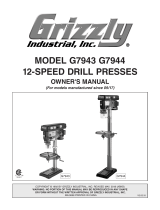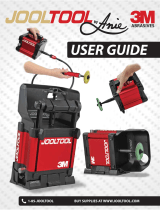Page is loading ...

For questions or help with this product contact Tech Support at (570) 546-9663 or techsupport@grizzly.com
MODEL T10538
12-PIECE GLASS/
GRANITE DRILLING SET
INSTRUCTIONS
COPYRIGHT © APRIL, 2012 BY GRIZZLY INDUSTRIAL, INC.
WARNING: NO PORTION OF THIS MANUAL MAY BE REPRODUCED IN ANY SHAPE
OR FORM WITHOUT THE WRITTEN APPROVAL OF GRIZZLY INDUSTRIAL, INC.
#BL14979 PRINTED IN CHINA, REVISED SEPTEMBER, 2016 (JH)
Introduction
This set features 11 diamond bits that cut through
mirror, non-tempered glass, ceramics, porcelain,
limestone, marble, and granite. DO NOT drill tem-
pered glass! Tempered glass will shatter.
These bits can be used with a handheld drill or
drill press. Use a drill press whenever possible for
greater control and precision (see Figure 1).
Eye injuries, respiratory problems, or hear-
ing loss can occur while operating this
tool. Wear personal protective equipment to
reduce your risk from these hazards.
Drilling Speeds
Use the chart below to select the appropriate drill-
ing speed (RPM) for the bit.
IMPORTANT: Use only light to medium pressure
when drilling. Increased pressure will not increase
cutting speed. Always ensure drill bit is properly
lubricated with water to prolong bit life and ensure
clean cuts.
Figure 1. Model T10538 12-piece drill bit set.
Description Qty
A. Drilling Guide .............................................. 1
B. Bits
3
⁄16",
1
⁄4",
5
⁄16",
3
⁄8",
1
⁄2",
3
⁄4",
7
⁄8",
1", 1
1
⁄8", 1
1
⁄4", 1
3
⁄8" ..................................1 Ea.
Inventory
A
B
Bit Size Fiberglass
Glass/
Ceramic
Tile
Granite/
Porcelain
3
⁄16"–
3
⁄8" 110 0 R PM 700 RPM 350 RPM
3
⁄8"–
1
⁄2" 800 RPM 550 RPM 300 RPM
1
⁄2" –
3
⁄4" 600 RPM 450 RPM 250 RPM
3
⁄4" – 1
3
⁄8" 500 RPM 350 RPM 200 RPM
To prolong bit life and ensure clean cuts ,
only apply light pressure to workpiece, use
appropriate drill speed for material, and
thoroughly lubricate drill bit with water.
DO NOT use diamond bitS to drill through
tempered glass, as it will shatter.

-2-
T10538 Drilling Set
Guide Setup & Operation
If using a handheld drill, always use the included
guide to keep the bit centered.
To set up and operate the guide:
1. Press guide down onto workpiece, then flip
lock levers, as shown in Figure 2, to secure
guide down.
Figure 2. Model T10538 guide set up for drilling.
Bit
Lock
Lever
Plate
Lock
Knob
Guide Hole
2. Loosen lock knobs, then slide plate back
enough to pour a small amount of water into
guide hole.
3. Insert drill bit into guide hole and slide plate
cutout against outer edge of bit until snug,
then tighten the knobs. Use small cutout for
3
⁄16"–
1
⁄2" bits, or large cutout for
3
⁄4"–1
3
⁄8" bits.
4. Tug guide to ensure it is secure. If it moves,
unlock both lock levers and repeat Steps
2–3.
5. Add water to guide hole as needed to main-
tain a slurry, and turn drill ON to begin drill-
ing.
6. When drilling is complete, loosen lock knobs,
unlock both levers, and remove guide.
To remove plug from drill bit:
1. Spray water into access channels on side of
drill bit to remove built-up slurry.
2. Tap drill bit lightly against a soft piece of
wood to loosen plug.
3. Insert a flat head screwdriver into access
channels to push pug from drill bit.
Operation Tips
• To reduce chip-out or breakage, place a
backing board to support the workpiece and
reduce pressure when finishing the hole.
• Make sure the workpiece is clean and moist
so the suction cup grips the workpiece.
• Use an eye dropper or spray bottle to add a
small amount of water to the drilling area (e.g.
1 teaspoon at a time). Avoid using oil-based
lubricants.
• Harder materials may require a constant flow
of water to properly lubricate and keep drill bit
cool during use.
• The amount of water required to properly
lubricate the bit depends on the porosity of
the workpiece. A good rule of thumb is to
start with a puddle of water approximately the
same diameter as the bit. Non-porous mate-
rial, such as glass or marble, may not need
additional water (depending on the thick-
ness). Porous material, such as slate or tile,
will slowly absorb water, which will require
replacement. Most importantly, never allow
the bit to run dry.
• As the groove gets deeper, move the bit up
and down while drilling to allow water to flow
back into the cutting groove, cooling the bit.
Add water if the slurry become too thick.
• Use minimal pressure while drilling to avoid
breaking the workpiece. Allow the drill bit to
do the work.
• The drill bit should never be hot to the touch.
Decrease pressure, increase lubrication, or
change drilling speed to keep bit cool.
• Always use the guide when drilling with a
handheld drill.
• Never use the bits in an impact hammer.
Doing so will cause the tip of the bit to split
and shatter the workpiece.
• Follow all safety and operation instructions
for your drill press or handheld drill. Avoid
exposing electrical equipment to water as
contact with water could cause electrocution.
/





